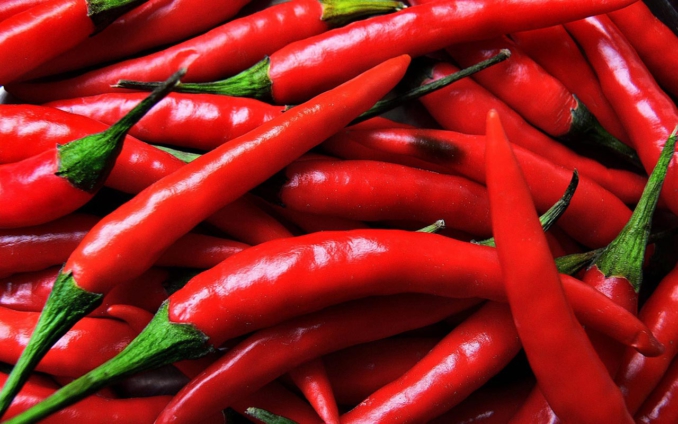GIRSAL, USAID Ghana Trade and Investment Activity, VegPro Kenya, and other partners have initiated a pilot project to grow and export chili pepper using net house technology to meet the phytosanitary requirements of the EU market. This move is part of GIRSAL's 5-year strategic plan to support export-related value chains such as vegetables, avocado, mango, and pomegranate, as well as for import substitutes like rice, broiler chicken, maize, tomato, and cassava.
Chili pepper cultivation has tremendous potential for increasing farmer incomes and generating foreign exchange revenues in Ghana, as its most exportable chili varieties (Legon 18, M 1.2, Scotch bonnet, Jalapeno and Bird's eye) are in high demand in the UK, France, the Netherlands, and Germany.
Before 2015, Ghana was the largest fresh chilli exporter to the United Kingdom outside of the European Union, exporting 1,903MT valued at USD 5.2 million. This is attributed to Ghana having a favourable seasonal marketing window to export to the United Kingdom as it coincides with the dry season in India, a major competitor in the chilli export market.
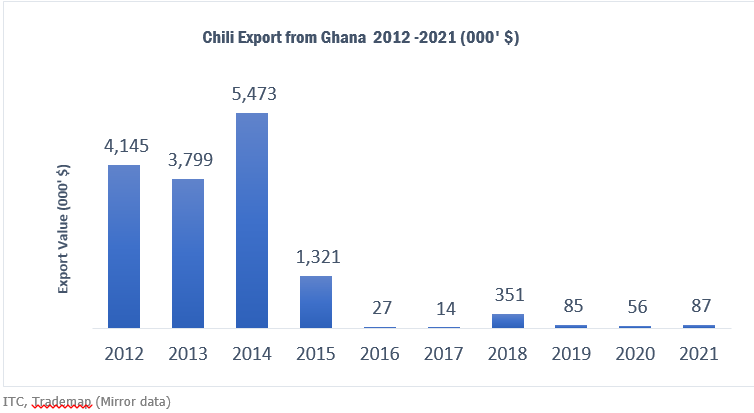
Between 2012 and 2014, Ghana exported chili worth over 13.4 million. However, in 2015, the export value of the commodity experienced a sharp decline, as the country faced a ban on exporting chili and four other vegetables to the EU in the face of increased interceptions and notifications between 2012 and 2015 at the EU borders because of the presence of quarantine pests in Ghanaian vegetable exports.
The non-compliance with sanitary and phytosanitary measures, both on the farm and at exit points, led to increased interceptions. Coddling Moth, which affects Ghanaian chili pepper production, was identified as one of the four quarantine pests by the European Commission Implementing Directive 2017/1279. The European Commission implementing directive 2019/523 required all fruit and vegetables entering the EU to be grown in pest-free areas where no detections have occurred and harvested product must not show signs of any organism.
In 2015, the European Union imposed a ban on vegetable exports to its market due to non-compliance with sanitary and phytosanitary requirements, in spite government of Ghana’s pre-emptive measure to impose a voluntary ban on the export of vegetables to the EU. The move by the EU was necessary for Ghana to institute necessary measures to address increasing levels of pest infestation in vegetable products arriving at EU ports. The EU ban was removed in November 2017 following an improvement in technical competence, inspection, and traceability, and the installation of pest detection equipment at Kotoka International Airport.
Since the EU ban was removed vegetable exports, especially chilies have not recovered to the pre-EU ban levels. Ghana exported only USD 87,000 worth of fresh chili to Europe in 2021, accounting for less than 0.5% of the worldwide market share, indicating the substantial potential for the fresh chili value chain. (Source Trademap)
Market Potential
The demand for fresh chilies in Europe is on the rise due to the increasing popularity of ethnic cuisines that use fresh chili peppers as a key ingredient, and the growing cultural diversity, particularly the rising population of African and Asian descent in Europe. The Centre for the Promotion of Exports from Developing Countries (CBI) reported a 50% increase in the import of fresh chilies from outside the EU to Europe between 2015 to 2020, with 46,000 tons imported in 2020 alone. In the UK, imports have ranged from 6,000 to 6,500 tons annually.
Ghana has an estimated untapped world market potential of USD 380 million for fresh chili over five years. This demand increase is due to the growing popularity of ethnic cuisines that use chilies in their recipes. The United Kingdom is a significant importer of fresh chilies due to the substantial number of ethnic communities that incorporate chilies into their traditional dishes. The Brexit and preferential trade agreements provide an opportunity for Ghana to expand its exports to the UK.
The per capita consumption of fresh chili in the United States of America has increased from just over 3 pounds to more than 7 pounds between 1980 and 2020, a 135% increase over the period, primarily driven by immigrants, according to the USDA-Economic Research Services. Imports have played a significant role in meeting most of the increased demand.
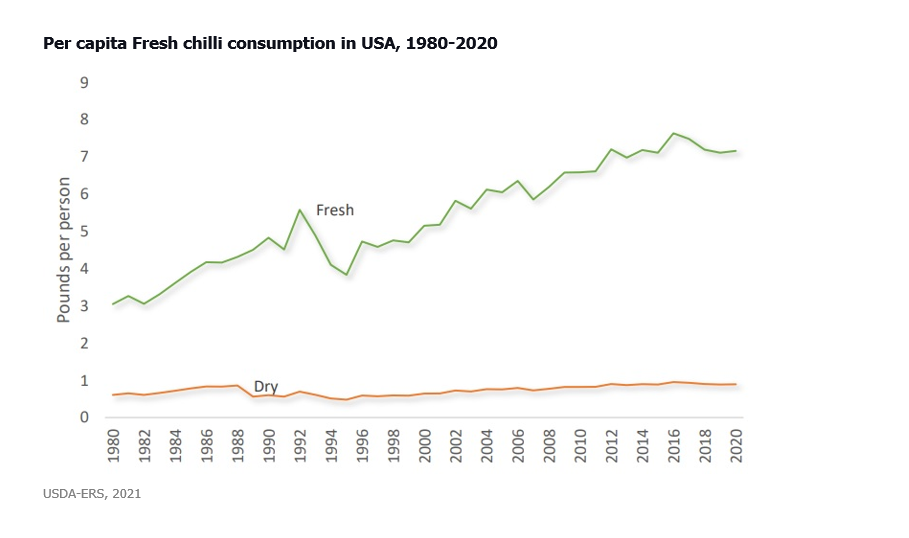
Project Partners and Purpose
The project has identified four locations for commercial trials, namely the Dahwenya irrigation site in the Greater Accra region, as well as Ziope, Woadze, and Kyekyewere in the Volta and Eastern regions. The plan is to work with vegetable industry association members to establish four hectares of net houses in these locations.
This initiative's main objective is to establish and validate the concept of a business case for chili production in net houses. To achieve this, the project aims to establish production protocols, determine the costs of setting up production equipment and infrastructure such as net houses and irrigation, and measure the production output and expected revenue per hectare.
The results of the commercial trials will be utilized to develop a business case for private sector investment in net houses to produce vegetables for export. This includes agribusinesses and financial institutions who can use the findings to inform their investment decisions.
GIRSAL, the lead organization in the implementation of the commercial trial of chili pepper production in net houses, has partnered with several organizations to ensure the successful execution of the pilot program. These partners include VegPro Kenya, USAID GTI (Ghana Trade and Investment) project, Plant Protection and Regulatory Services (PPRSD), Ghana Export Promotion Authority, and Yara Ghana.
- As the lead organization, GIRSAL provides technical support and program coordination and has identified suitable locations to operationalize the production trials. Additionally, GIRSAL and the USAID GTI project are co-financing the program and will work together to produce a financial business model to attract investment from interested exporters and provide credit guarantee support to facilitate their access to finance.
- GTI, on the other hand, will collaborate with GIRSAL to identify the industry stakeholders for the pilot project and assist in undertaking a cost-benefit analysis of the piloted production technology. They will also explore potential investment and access to finance mechanisms to support interested exporters in adopting and commercializing the technology.
- As a technical advisor, VegPro Kenya is providing advisory services on the technical details associated with the procurement and operationalization of the shade net setup and will provide technical protocols, guidance, and support for the pilot project. In addition, VegPro will create an export market avenue for the pilot commodity.
- Yara Ghana, a sustainable crop nutrition solutions provider, will provide fertilizer and agrochemicals for the project.
- PPPRSD, the Ministry of Food and Agriculture directorate, will support the certification, development, and approval of production guides and standards in net houses.
- GEPA will also facilitate all necessary export requirements and measures to ensure that the chilies harvested are exported to the European market.
These strategic partnerships will ensure the successful implementation of the pilot project.
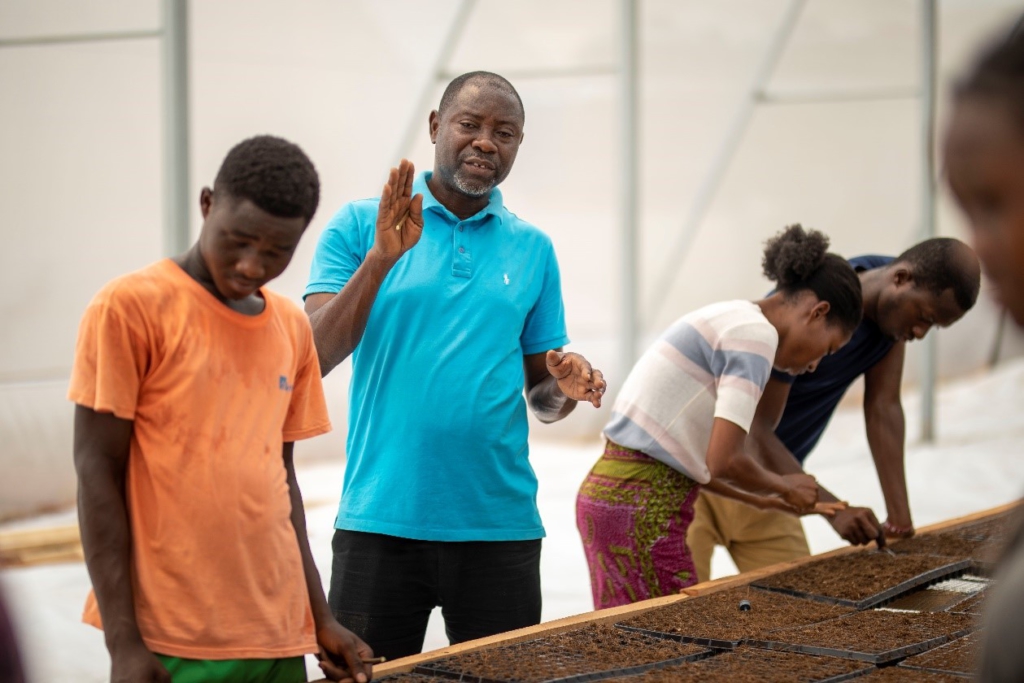
Currently, the pilot has been rolled out in trial production on a 0.4-hectare net house at the Agri Impact greenhouse enclave in Dawhenya. A team of experts from GIRSAL, led by the Director of Agribusiness, Mr. Samuel Yeboah, has already nursed the selected variety of chili (Bird Eye) in a protected nursery house. They expect to transplant to the main shade net house in about six weeks. During this nursery period, the team collaborates with the technical partners PPRSD and VegPro Kenya to ensure that good agricultural practices are followed.
Shade Net Technology
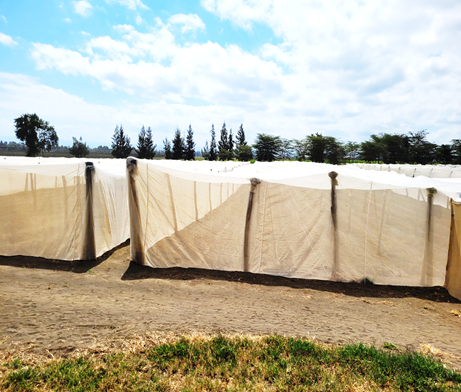
Shade net technology is a form of protected cropping structure that offers an ideal environment for plant growth, and protection from sunlight, wind, and pests. It is easier to install, low-cost, and better suited for warmer climates compared to greenhouses. This technology reduces the risk of insect pest invasion, as it uses insect-proof nets, and minimizes wind damage and water stress during hot, dry, and windy conditions. This, in turn, increases the yield and quality of produce. Furthermore, the use of integrated pest management (IPM) practices reduces the reliance on pesticides.
In the context of lifting the ban on fresh chili export to Europe, the European Union Regulatory Department has recommended production in net houses as an integral component in the phytosanitary measures for producing high-quality chilli. Using this technology for chili production can significantly improve the quality and quantity of produce, making it more marketable. Reducing reliance on pesticides also promotes sustainable agricultural practices.
Expected Impact
The GIRSAL-led pilot project, in collaboration with its technical and funding partners, as well as the vegetable industry association has the potential to make a significant impact on Ghana's vegetable industry. The results of the project would be used to establish a viable business case and develop a production protocol for the industry players to follow[KK1] [TS2] . This development will not only help to recapture the lost market share in the international market but also improve the quality of chilies produce, thereby boosting the local vegetable market, and generating foreign exchange to support Ghana's economy.
The project is also poised to create employment opportunities, thereby increasing their income, and contributing to the economic growth of Ghana. Overall, this project has the potential to generate foreign exchange, create jobs and improve the livelihood of the people, making it a significant milestone in Ghana's agricultural development.
Latest Stories
-
I’m confident posterity will judge my performance well – Akufo-Addo
7 minutes -
Syria’s minorities seek security as country charts new future
48 minutes -
Prof. Nana Aba Appiah Amfo re-appointed as Vice-Chancellor of the University of Ghana
55 minutes -
German police probe market attack security and warnings
55 minutes -
Grief and anger in Magdeburg after Christmas market attack
56 minutes -
Baltasar Coin becomes first Ghanaian meme coin to hit DEX Screener at $100K market cap
2 hours -
EC blames re-collation of disputed results on widespread lawlessness by party supporters
2 hours -
Top 20 Ghanaian songs released in 2024
2 hours -
Beating Messi’s Inter Miami to MLS Cup feels amazing – Joseph Paintsil
3 hours -
NDC administration will reverse all ‘last-minute’ gov’t employee promotions – Asiedu Nketiah
3 hours -
Kudus sights ‘authority and kingship’ for elephant stool celebration
3 hours -
We’ll embrace cutting-edge technologies to address emerging healthcare needs – Prof. Antwi-Kusi
3 hours -
Nana Aba Anamoah, Cwesi Oteng special guests for Philip Nai and Friends’ charity event
3 hours -
Environmental protection officers receive training on how to tackle climate change
3 hours -
CLOGSAG vows to resist partisan appointments in Civil, Local Government Service
5 hours

